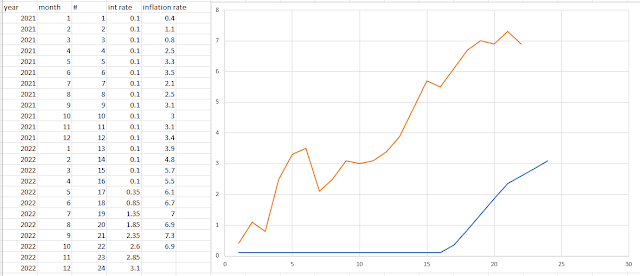As I am about to take on a sizable mortgage, inflation and interest rates (and their future magnitude) is of considerable interest to me. After a prolonged period of very low (below the RBA's 2-3% target range) inflation, the transition to 'Covid-normal' lifestyles around the developed world led to a burst of inflation. Ongoing 'zero Covid' lock-downs in China certainly didn't help. After initially believing it was a just temporary blip (and would revert to previous low levels automatically), central banks realized that there was a risk of permanently higher inflation, with the possibility of it becoming 'entrenched' if people came to expect it would persist, and therefore demanded higher wages, which in turn leads to higher costs and prices in a 'vicious cycle'. The Russo-Ukraine war (and its impact on energy prices and fertilizer and food production) also gave a further boost to global inflation and made it more likely to persist.
So, in Australia, the RBA 'woke up' to the fact that inflation wasn't going to revert to its 2%-3% range naturally by around May this year. It then rapidly lifted rates by 0.5% increments each month for several months, and then reduced the rate of increase to a more 'normal' 0.25% increment in recent months as they wait to see when (and at what level) inflation 'peaks'.
There was a possible indication in the recent cpi figures that inflation *might* have peaked around 7% in the second half of 2022, which explains why the RBA has been content to use 0.25% increments. The RBA does not announce a rate change in January, so the next decision on rates won't be announced until Feb 2023. If the inflation rate continues to hold around 7% (or starts to moderate) there may be few (or no) more rate increases in 2023. On the plus side oil prices have been trending down since mid-year, and may drop below $70 if there is a global recession. But there have recently been some pushes for wages to rise in line with inflation, and a 7% rise in AWOTE would make it difficult for inflation to be brought rapidly back down to the 2-3% target of the RBA.
Home mortgage rates are generally 1.5-2% above the 'cash rate', so further increases in the cash rate during 2023 will flow through to higher mortgage interest rates. On the other hand, rising interest rates and falling real estate prices generally lead to a 'bust' in the building industry, which eventually leads to a tightening of housing stock and rising rents. So rents *may* rise in line with mortgage repayments to some degree. Hard to predict how things will develop during 2023 - I certainly wasn't expecting to see inflation to rise to 7% when I bought my investment apartment 'off-the-plan' back in 2019.
The RBA cash rate decisions certainly appear to be 'lagging' the movements in the inflation rate by a year or more, so I hope the RBA doesn't keep raising rates for too long and ends up throwing the Australian economy into a deep recession like in 1982 or 1991. A lot will depend on what the cpi numbers are during the next two months. Good figures would probably see the RBA 'pause' further rate hikes for a couple of months, but they are unlikely to reduce rates until they have confirmation that inflation has been brought under control. So even if inflation has peaked the RBA is unlikely to contemplate any reduction in the cash rate until at least the middle of 2023.
Subscribe to Enough Wealth. Copyright 2006-2022

No comments:
Post a Comment